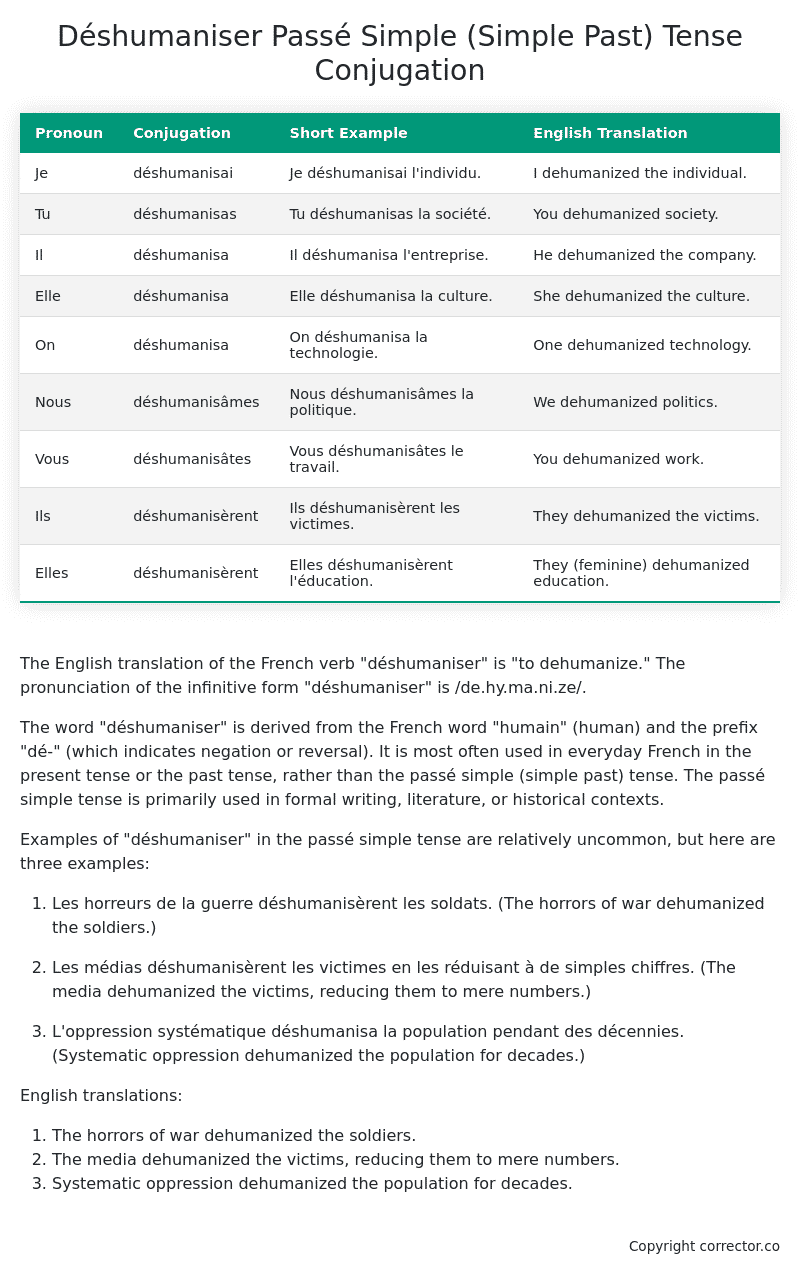Passé Simple (Simple Past) Tense Conjugation of the French Verb déshumaniser
Introduction to the verb déshumaniser
The English translation of the French verb “déshumaniser” is “to dehumanize.” The pronunciation of the infinitive form “déshumaniser” is /de.hy.ma.ni.ze/.
The word “déshumaniser” is derived from the French word “humain” (human) and the prefix “dé-” (which indicates negation or reversal). It is most often used in everyday French in the present tense or the past tense, rather than the passé simple (simple past) tense. The passé simple tense is primarily used in formal writing, literature, or historical contexts.
Examples of “déshumaniser” in the passé simple tense are relatively uncommon, but here are three examples:
-
Les horreurs de la guerre déshumanisèrent les soldats.
(The horrors of war dehumanized the soldiers.) -
Les médias déshumanisèrent les victimes en les réduisant à de simples chiffres.
(The media dehumanized the victims, reducing them to mere numbers.) -
L’oppression systématique déshumanisa la population pendant des décennies.
(Systematic oppression dehumanized the population for decades.)
English translations:
- The horrors of war dehumanized the soldiers.
- The media dehumanized the victims, reducing them to mere numbers.
- Systematic oppression dehumanized the population for decades.
Table of the Passé Simple (Simple Past) Tense Conjugation of déshumaniser
| Pronoun | Conjugation | Short Example | English Translation |
|---|---|---|---|
| Je | déshumanisai | Je déshumanisai l’individu. | I dehumanized the individual. |
| Tu | déshumanisas | Tu déshumanisas la société. | You dehumanized society. |
| Il | déshumanisa | Il déshumanisa l’entreprise. | He dehumanized the company. |
| Elle | déshumanisa | Elle déshumanisa la culture. | She dehumanized the culture. |
| On | déshumanisa | On déshumanisa la technologie. | One dehumanized technology. |
| Nous | déshumanisâmes | Nous déshumanisâmes la politique. | We dehumanized politics. |
| Vous | déshumanisâtes | Vous déshumanisâtes le travail. | You dehumanized work. |
| Ils | déshumanisèrent | Ils déshumanisèrent les victimes. | They dehumanized the victims. |
| Elles | déshumanisèrent | Elles déshumanisèrent l’éducation. | They (feminine) dehumanized education. |
Other Conjugations for Déshumaniser.
Le Present (Present Tense) Conjugation of the French Verb déshumaniser
Imparfait (Imperfect) Tense Conjugation of the French Verb déshumaniser
Passé Simple (Simple Past) Tense Conjugation of the French Verb déshumaniser (You’re reading it right now!)
Passé Composé (Present Perfect) Tense Conjugation of the French Verb déshumaniser
Futur Simple (Simple Future) Tense Conjugation of the French Verb déshumaniser
Futur Proche (Near Future) Tense Conjugation of the French Verb déshumaniser
Plus-que-parfait (Pluperfect) Tense Conjugation of the French Verb déshumaniser
Passé Antérieur (Past Anterior) Tense Conjugation of the French Verb déshumaniser
Futur Antérieur (Future Anterior) Tense Conjugation of the French Verb déshumaniser
Subjonctif Présent (Subjunctive Present) Tense Conjugation of the French Verb déshumaniser
Subjonctif Passé (Subjunctive Past) Tense Conjugation of the French Verb déshumaniser
Subjonctif Imparfait (Subjunctive Imperfect) Tense Conjugation of the French Verb déshumaniser
Conditionnel Présent (Conditional Present) Tense Conjugation of the French Verb déshumaniser
Conditionnel Passé (Conditional Past) Tense Conjugation of the French Verb déshumaniser
Conditionnel Passé II (Conditional Past II) Tense Conjugation of the French Verb déshumaniser
L’impératif Présent (Imperative Present) Tense Conjugation of the French Verb déshumaniser
L’impératif Passé (Imperative Past) Tense Conjugation of the French Verb déshumaniser
L’infinitif Présent (Infinitive Present) Tense Conjugation of the French Verb déshumaniser
L’infinitif Passé (Infinitive Past) Tense Conjugation of the French Verb déshumaniser
Le Participe Présent (Present Participle) Tense Conjugation of the French Verb déshumaniser
Le Participe Passé (Past Participle) Tense Conjugation of the French Verb déshumaniser
Struggling with French verbs or the language in general? Why not use our free French Grammar Checker – no registration required!
Get a FREE Download Study Sheet of this Conjugation 🔥
Simply right click the image below, click “save image” and get your free reference for the déshumaniser Passé Simple tense conjugation!

Déshumaniser – About the French Passé Simple (Simple Past) Tense
Formation
Usage
Narration
Historical Context
Interactions with other tenses
Passé Composé
Imparfait
Conditional and Subjunctive
Summary
I hope you enjoyed this article on the verb déshumaniser. Still in a learning mood? Check out another TOTALLY random French verb conjugation!


